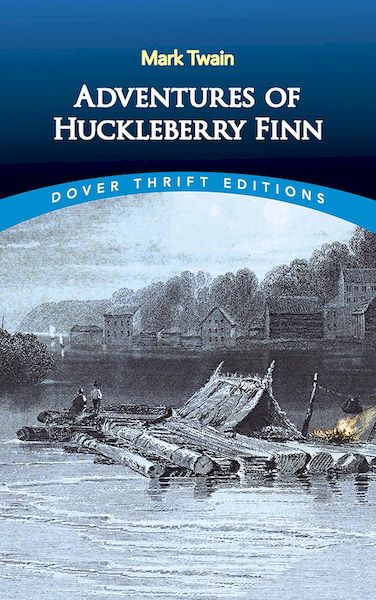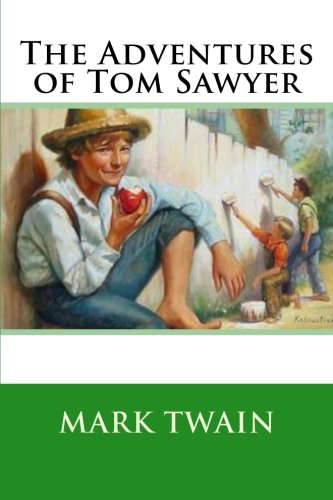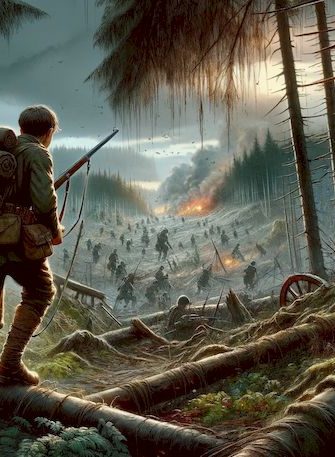Who doesn’t know him, the rebellious teenager with the big straw hat? But The Adventures of Huckleberry Finn is much more than a harmless children’s book that introduces boys to the world of adventure. Mark Twain’s second book about the young Huckleberry Finn (after Tom Sawyer), who is rejected by a hypocritical society, is not only adventurous but sometimes very critical of civilization and downright dark. It is about slavery, the value of a human being, lies and deceit, moral behaviour and true friendship. It is not only the Southern romance that Mark Twain ironizes, but also his portraits of the people of Illinois and Arkansas, drawn with a sharp pen, that make the novel an authentic slice of a rather dark era in the United States. With a light touch, Twain dismantles the self-evident through the naively observant perspective of the youthful hero so that the world takes on a magical quality. At the end of the journey down the Mississippi, the most American of American words are written with a big exclamation mark: Freedom!

- Take Aways
- Summary: The Adventures of Huckleberry Finn by Mark Twain
- What Happened Before
- Life at the Widow’s House
- A Body in the River
- The Kidnapping
- The Escape
- On Jackson Island
- Flight South
- A Narrow Escape
- A Deadly Feud
- Two Hustlers
- A Great Coup
- An Elaborate Plan
- About the Text
- Interpretation
- Historical Background
- Slavery in America
- Origins
- History of Impact
- About the Author
Take Aways
- The Adventures of Huckleberry Finn is Mark Twain’s magnum opus. It is the sequel to Tom Sawyer’s Adventures.
- Both novels were huge commercial successes, but only Huckleberry Finn is considered one of the “crown jewels” of American literature.
- Adolescent Huck (Leberry) Finn, the neglected son of a hobo, is adopted and “civilized” by the widow Douglas.
- But the freedom-loving boy feels threatened by social constraints and escapes to adventure with his friend Tom Sawyer several times.
- Suddenly, Huck’s missing father appears and demands that his son return the treasure he and Tom found some time ago.
- Since the old Finn can’t get his hands on the money, he kidnaps his son and hides him in a lumberjack’s cabin on the Mississippi River.
- Huck breaks out of the cabin, fakes his murder, and drifts down the river to a small island.
- There, he meets and befriends Jim, an escaped enslaved person. Together, they travel down the Mississippi on a raft.
- After a collision with a paddlewheeler, the two are separated but are reunited after several adventures.
- Two crooks use the two fugitives for their robberies. Finally, they sell the wanted Jim to a family in Arkansas.
- Huck succeeds in freeing Jim with the help of Tom Sawyer. Ultimately, Jim is freed, and Huck flees society again to the West.
- The book has influenced many modern writers such as Ernest Hemingway and J.D. Salinger. But it was also often banned by censors — because the word “nigger” appears so usually, it was misinterpreted as racist.
Summary: The Adventures of Huckleberry Finn by Mark Twain
What Happened Before
The Adventures of Tom Sawyer ends with Huckleberry Finn and Tom Sawyer finding a large sum of money hidden by a band of robbers. They each get $6,000 — a considerable sum for the boys — which Judge Thatcher invests for them in the bank. The Widow Douglas and her highly conservative and religious sister, Miss Watson, adopt Huckleberry, but he resists their attempts to “civilize” him and runs away. Tom persuades him to return. He does, but Huck is not happy.
Life at the Widow’s House
While Huckleberry likes some of the luxuries of his new life, he misses the freedom to do and wear what he wants. His new clothes make him feel “constricted,” he struggles with the strict schedule at Widow Douglas’ house and doesn’t see the point of saying his prayers or reading the Bible. One night, when Huckleberry is feeling down, Tom appears in the yard, and together, they steal away. Tom plans to start a gang of robbers with Huck and other boys. Tom makes each boy swear an oath of allegiance, which he has cobbled together from several pirate and robber stories he has read. They all sign the oath with their blood and decide that their “line of business” will be robbery and murder.
A Body in the River
One day, some locals fish a body out of the river past the town. Although it’s badly bloated, they think it might be Huck’s father, a violent alcoholic who never bothered with his son except to beat him viciously. Huck is relieved to hear the news, though he’s not entirely convinced that the body is indeed his father’s. Meanwhile, the gang continues to meet, but they never move beyond “pretend” robberies fueled by Tom’s imagination. Soon, the gang breaks up.
“Right is right, and wrong is wrong, and a body ain’t got no business doing wrong when he ain’t ignorant and knows better.” (Huck Finn)
Winter comes, and Huck attends school reasonably regularly, learning to spell, write, and do arithmetic. One morning, he sees footprints in the snow outside the Widow Douglas’s house. When he looks closer, he realizes they are his father’s footprints. Huck runs straight to Judge Thatcher and asks him to take all his savings. He fears that his father has only returned for the money but does not tell Judge Thatcher his suspicions. The Judge, guessing the reason, makes a deal with Huck to pay him $1 for his property. Huck signs the papers and returns home. When he gets to his room that evening, his father awaits him.
The Kidnapping
Huck’s father wants Huck’s money, but Judge Thatcher refuses to give it to him. The Judge and the Widow Douglas try to get custody of Huck, but a new judge in town, who knows nothing about Huck’s father, decides it wouldn’t be good to separate father and son. The new Judge takes Huck’s father in and tries to reform him, but he is soon defeated. Huck’s father starts a lawsuit to get Huck’s money. He also tries to keep the boy from going to school. When the widow tells him to stay away, he waits for Huck and kidnaps him. He takes him across the river to Illinois to an old wooden cabin. They live on what they can fish and hunt, and Huck enjoys the freedom of not having to wash, dress appropriately, eat off a plate, and so on. Soon, however, his father begins to beat him again. He also locks Huck in the cabin whenever he goes away, sometimes for several days.
The Escape
Huck can’t take it anymore and hatches a plan to escape. He finds a rusty saw and begins to cut a hole in the cabin wall while his father is away. When the man returns, he’s in a foul mood because the lawsuit over Huck’s money is dragging on. Also, the Judge and the widow have made another attempt to become Huck’s guardians. The idea of returning to “civilization” doesn’t appeal to Huck, and he plans to run away that night after his father drinks himself into oblivion. However, Huck falls asleep with the gun in his lap and wakes up late the following day. To explain why he has the weapon, he tells his father that he heard someone walking around the cabin. His father sends him to fish, and Huck finds a canoe floating down the river. He pulls it to shore and hides it. In the afternoon, his father goes back to town, and Huck sets to work. He takes all the food and tools from the cabin and loads them into the canoe, then shoots a wild pig and splatters its blood around the cabin, staging his murder. He leaves an axe with blood and some of his hair and sets off in the canoe for Jackson Island.
On Jackson Island
Huck enjoys the solitude and freedom of the island, but three days after arriving, he comes across a still-smoking campfire. Frightened, he packs up all his belongings and sleeps in the canoe. In the morning, he finally gathers enough courage to find out who is on the island with him. To his surprise and relief, it’s Jim, Miss Watson’s slave. Jim tells him that Miss Watson has decided to sell him to a slave trader, so he has run away. Huck promises not to tell on him. The two set up camp in a cave, where they wait out a storm that lasts over a week and floods parts of the island. When the storm passes, they go exploring in Huck’s canoe. They come across a two-story wooden house floating by and climb inside. They find the body of a man shot in the back. Jim looks at his face but tells Huck to stay away because it’s “too gruesome”. Jim covers the body with some old rags. They take what they can from the boat and return to the island.
Flight South
Huck is curious: he wants to discover what people are saying about him and his “death,” so he dresses up as a girl and enters town. From a woman who recently moved to town, he learns that people first suspected his father of his murder, but now they believe it was Jim since he disappeared at the same time. There is a $300 reward for Jim’s capture. The woman tells Huck that her husband has decided to search Jackson Island the next day because he saw smoke on the island. Huck rushes back to the island, and he and Jim pack their belongings on a raft they found and set out. As they float down the Mississippi, they come across a stranded steamboat. They climb aboard and encounter three criminals, two of whom have ganged up on the third and are about to shoot him. As Jim and Huck try to escape before the three men notice them, they find that their raft has broken loose and drifted away. They steal the criminals’ boat and soon catch up to their raft.
A Narrow Escape
Jim and Huck’s goal is to get to Cairo, where the Mississippi and Ohio rivers meet. They plan to sell their raft and take a steamboat up the Ohio River to the states where slavery has been abolished. One night, they get caught in a thick fog and become separated. As they drift down the river, Jim talks about what he will do as a free man: work, save some money, and buy his wife and children. Huck begins to feel guilty about helping a slave escape. He decides he has to tell someone, so he takes the canoe and paddles off under the pretence of finding out if they have reached Cairo. As he leaves, Jim shouts after him that Huck is the best friend he has ever had. Huck is confused; he now feels as if he is betraying Jim. He only gets far from the raft after two men in a boat stop him. They are looking for five runaway slaves and begin questioning Huck. He prevents them from searching the raft by telling them that his father is there and that he has smallpox. Afraid of catching the contagious disease, the men give Huck money and advice on how to get to the nearest landing place; the men then move on. Jim, who has overheard the conversation, feels his trust in Huck is justified: his friend has lied to and saved him.
A Deadly Feud
Jim and Huck realize they have drifted past Cairo because of the fog. They can’t get back upriver because they’ve lost their canoe. To make matters worse, a steamboat rams their raft and splits it in two. Huck makes it to shore, but there is no sign of Jim. A local family, the Grangerfords, takes in Huck. From their son Buck, Huck learns that the family has had a long-standing feud with another local family, the Shepherdsons, which has resulted in several deaths on both sides. No one knows what started the feud, but the fighting between the families continues. One day, after Huck and the family return from church, Miss Sophie, one of the Grangerford daughters, asks Huck if he would return to the church to get her Bible. He does so but suspects something is wrong. When he picks up the Bible, he finds a note that says “Half-Past Two”. He tries to understand what this could mean but gives the book and note to Miss Sophie without saying anything.
“Human beings can be awful cruel to one another.” (Huck Finn)
The enslaved person “assigned” to Huck comes to him with a strange request: He asks if he can show Huck a place where there are water moccasins (poisonous snakes). Huck senses something is up and follows the enslaved person. He finds Jim asleep in the middle of a swamp, well hidden by bushes and a tree. Huck wakes him, and Jim tells him what happened after the steamboat rammed them. He tried to follow Huck but was too slow to catch up. Afraid that someone would catch him and force him back into slavery, Jim decided to hide. He met some other enslaved people who lived nearby and decided to send a message to Huck. The following day, Miss Sophie is gone. She has eloped and married Harney Shepherdson. The Grangerfords swear revenge and go after the Shepherdsons. Buck is killed in the ensuing shootout. Huck and Jim escape.
Two Hustlers
Jim and Huck continue their journey down the river. They pick up two men on the run. The older man claims to be the Duke of Bridgewater and asks to be addressed as “Your Grace”, “My Lord” or “Your Lordship”. Not to be outdone, the younger man says that he is a descendant of Louis XVI and, therefore, should be called “Your Majesty”. Huck quickly realizes that the two are nothing more than fraudsters and hustlers who travel around trying to trick people. However, as free white men, they are in a better position than Jim and Huck, so Huck pretends to go along with their game. He tells them that Jim is his slave and that they are on their way to his uncle, who lives in the South. Soon, the Duke and the King take control of the raft. They keep stopping along the way, coming up with new and outrageous schemes to cheat people out of their money. For example, in Parkville, the King attends a church meeting and pretends to be a reformed pirate who wants to spread the gospel to other pirates. He receives $80 in donations to help him on his mission. The two put on a ridiculous theatrical show at their next stop and walk away with several hundred dollars in their pockets.
A Great Coup
A few days later, Huck and the King meet a young man who tells them of recent events in the nearby village: Peter Wilks has just died, leaving behind three orphaned nieces, a small fortune, and property. The man had suffered a long illness and had hoped that his two remaining brothers, William and Harvey, would come over from England before he died. The King and the Duke see their chance to get the inheritance. They go to the village with Huck, pretending to be Wilk’s brothers. They are welcomed with open arms, and soon, the money is in their possession. Huck feels sorry for the three girls and decides to steal and give the money back to them. However, his well-intentioned plan goes awry. After stealing the money from the room of the Duke and the King, he is almost caught and forced to hide it in the coffin of the deceased, which is nailed shut and buried the next day. Huck convinces the Duke and the King that the enslaved people they sold the day before stole the money. When Huck finds Mary Jane, the oldest of the girls, crying in her room, he tells her everything. She agrees to stay with a friend for a day to allow Huck and Jim to escape before she exposes the two impostors. But shortly after she leaves the following day, Wilk’s real brothers show up. To prove that the King and Duke are lying, Harvey Wilks asks the King if he knows what his brother has tattooed on his chest. The King quickly makes something up, his word against Harvey Wilks’. The villagers dig up Peter’s body to find out who is right. When they open the coffin, they find the money. In the ensuing confusion, Huck manages to escape. He runs to the raft, where he and Jim set off, celebrating that they finally got rid of the King and Duke. But then they see a boat following them, carrying the two impostors. They resigned, and Jim and Huck took them back on board.
An Elaborate Plan
The four continue their journey south. They stop at several villages, but all the King’s and the Duke’s plans fail. They start making new plans after losing all their money and not making any. The King enters the village when they come to their next stop at Pikeville. He asks the Duke and Huck to follow him if he returns in the afternoon. When he doesn’t return, they follow him and finally find him drunk in a tavern. The Duke and the King fight, and Huck sees his chance to escape from both. He returns to the raft, only to find that Jim is gone. The King has sold him to a local family, the Phelps. Huck goes looking for Jim. The Duke tells Huck where Jim is after Huck promises not to cross them in their latest plan.
“Jim said bees wouldn’t sting idiots; but I didn’t believe that, because I had tried them lots of times myself, and they wouldn’t sting me.” (Huck Finn)
Huck goes to the Phelps’ house. To his surprise, Mrs. Phelps, or “Aunt Sally,” welcomes him with open arms. She believes him to be her nephew Tom Sawyer, whose arrival they have been expecting for days. Huck plays along. The next day, he goes to town to intercept Tom and tell him his plan to free Jim. Tom agrees to play along and help Huck. They introduce Tom to Aunt Sally and her husband, Uncle Silas, as Tom’s brother Sid.
Tom insists that they need an elaborate plan to free Jim. So, instead of just stealing the key and running away, the rescue plan becomes more and more complicated. Inspired by all the adventure stories he has read, Tom decides that they will have to use a knife to dig a tunnel under the wall of the shed, make a rope ladder out of sheets they steal from Aunt Sally, and climb down a lightning pole at night instead of taking the stairs. He also thinks Jim’s life as a prisoner is too easy, so he insists on bringing rats, snakes, and spiders into the cabin. He also asks Jim to write a diary in his blood on a shirt and to scratch “sad inscriptions” on the walls of the cabin. It takes them three weeks to carry out Tom’s elaborate and utterly ridiculous plan.
Happy Ending
Tom still needs to be happier with their escape plan. To complicate things, he sends anonymous notes to Aunt Sally and Uncle Silas, warning them that something is up. He even goes so far as to tell them the night and time when they will free Jim. A group of men with guns show up to help Aunt Sally and Uncle Silas. Jim, Huck and Tom must run for their lives as they try to escape. They make it to their raft, but Tom is shot in the leg. Huck returns to the village to get a doctor and then hides in a woodpile to see what happens. He falls asleep and wakes up late the following day. When he emerges from hiding, he runs straight into Uncle Silas. When asked where they had been, Huck tells Uncle Silas that he and Tom had decided to go after Jim and that Tom had gone to the post office to see if there was any news.
Along with Uncle Silas and Aunt Sally, Huck waits anxiously for Tom’s return. After two days, the doctor arrives with Tom on a mattress. He also has Jim with him, who is immediately put in chains. The doctor puts in a good word for Jim, who came out of hiding when he saw the doctor needed help with Tom’s wound, effectively giving up his freedom.
“You can’t pray a lie; I found that out.” (Huck Finn)
Tom recovers quickly. When he learns that Jim has been put back in chains, he is outraged and reveals what he has known for months: namely, that Miss Watson died two months ago and, in her will, stipulated that Jim be set free. Immediately, Jim is released, fed, and made a fuss over. Tom’s Aunt Polly appears and puts an end to the charade that Tom and Huck have been playing on the Phelps. Huck learns from Jim that the dead man they found in the house by the river was Huck’s father. Before Aunt Sally can try to adopt Huck and “civilize” him, Huck leaves for the West.
About the Text
Like the Mississippi River, on whose waters most of Huckleberry Finn’s adventures occur, the action flows rapidly in some areas and pauses in others. The novel’s beginning and end still have something of the idyllic juvenilia of the previous title about Tom Sawyer. The latter’s appearance at the end allows the text to drift into the romantic-adventurous. Huck’s escape from his hometown is different: the encounter with Jim turns the book into a novel of development. This tendency changes into a picaresque novel, into pure comedy when the two tricksters come on board, and Mark Twain pokes fun at the stupidity of the townspeople on the Mississippi. Perhaps the most crucial feature of the novel is its narrative perspective: Twain tells everything from Huckleberry Finn’s point of view, allowing him to portray the full range of an adolescent boy’s emotions and worldview: Naivety, curiosity, rejection, amazement, irony, impartiality — all this is reflected in the prose, which is presented in the bold Southern dialect (in the American original). This makes for a gripping and true-to-life read.
Interpretation
- Huckleberry Finn is a contradictory character: he is an outsider, a young vagabond who refuses to grow up and rebels against social conventions. At the same time, he embodies morality: Huck has a conscience and tries to be a good man amid a society of hypocrites and criminals (there are no fewer than 20 murders in the novel).
- Nature and civilization are significant contrasts in Mark Twain’s story, perhaps in Rousseau’s case. The freedom-loving Huck Finn feels mistreated by civilized society, which forces him to live a dull life. He escapes into nature and the wilderness.
- Huck’s conflict with society deepens when he meets Jim and is torn between society’s demands (to turn over the escaped enslaved person) and his moral thinking (Jim is his friend, even though he is enslaved). Twain spices up this conflict, which is difficult for a Southern hero of the time to resolve, with a burlesque and ironic portrayal of the stupid, nasty, or even malicious traits that “civilized society” has adopted.
- Many of the people Huckleberry Finn meets on his journey down the Mississippi are hypocritical and duplicitous. In this way, society becomes the hero’s antagonist in the novel. Social criticism is one of Mark Twain’s concerns.
- The Mississippi River decisively determines the form of the narrative. Twain stylizes the river and its tributaries, the small towns that line its banks, the rapids, and the islands in its middle as a microcosm for Huckleberry Finn.
- Huckleberry Finn is considered one of the first genuinely American novels because it has nothing to do with Europe: The action takes place on and along the Mississippi River, and the language is Southern American slang.
Historical Background
Slavery in America
Slavery in America can be traced back to the 17th century. Around 1620, the first enslaved Africans were brought to Virginia by English pirates. It was not until the second half of the 17th century that a real “slave boom” began, especially in what would become the southern states of the USA. The plantation system of cotton, tobacco, and sugar cane was established. Agriculture required many hands, and the slave trade and transportation to the English colonies proliferated. As the demand increased, so did the legislation — no wonder in the age of classical “liberalism”: enslaved people became the property of their owners, who could do with them as they pleased. Rape, mutilation, branding, and murder were common and rarely punished.
As technology advanced, a clear North-South divide emerged in America. While industry developed in the North, the South remained dependent on the plantation economy and, thus, on enslaved people. The North was opposed to slavery. The dispute between North and South also arose over the question of whether slavery should be allowed or banned in the new states of the Union. After Abraham Lincoln, the first “pro-slavery” president of the newly formed Republican Party, took power, some Southern states seceded from the Union between December 1860 and May 1861, forming the “Confederate States of America”. The bloody American Civil War between the North and the South began with the siege of Fort Sumter in South Carolina. With the surrender of the Southern states in April 1865, slavery ended nationwide, at least on paper. During Reconstruction, the process of reintegrating the southern states into the Union became clear that the issue of race had not been resolved. This led to creeping discrimination and the formation of racist secret societies such as the Ku Klux Klan.
Origins
Mark Twain began work on the sequel to Huckleberry Finn in 1876, immediately after the massive success of Tom Sawyer’s Adventures. Huckleberry Finn also appears as a minor character in the first part. However, the sequel developed differently than initially planned. Firstly, it took seven years to complete, and secondly, the background and atmosphere of the story changed. In the end, all that remained of the light-hearted first novel were the main characters and the setting. The darker tone of Huckleberry Finn, influenced by the problems of the slave trade, probably led Mark Twain to abandon the work for a long time. Under the impression of the problematic Reconstruction era, the subject of his novel seemed relevant again to Twain. The dark view of the world and society in The Adventures of Huckleberry Finn, albeit ironically broken, also coincided with Twain’s situation: his wife was ill, his first son died as an infant, and his speculations led to financial disaster. In this tense situation, Twain turned his attention back to his book. The manuscript was completed in 1883 and printed a year later.
History of Impact
Like the adventures of Tom Sawyer, Huckleberry Finn was an immediate success. Unlike its harmless predecessor, the book divided critics. Some praised it effusively and saw it as a parable against racism, while others failed to see this and condemned the work as “racist trash”. The book was even banned in some Southern states. In Concorde, Massachusetts, the public library decided in 1885 to remove the book from its collection because it “belonged in a slum rather than among intelligent and respectable people. Some readers today still take offence at the frequent use of the word “nigger,” overlooking the fact that the term was common in the historical context and that Twain intended to convey his criticism precisely through the realistic description of circumstances.
Among literary experts, Mark Twain’s novel is considered one of the key works in American literary history. Ernest Hemingway even said: “All of modern American literature comes from a book by Mark Twain called Huckleberry Finn”. In addition to the numerous YA novels and film adaptations, Huck Finn has been the inspiration for many other literary contemporaries who try to understand growing up through the eyes of a teenager, such as Holden Caulfield in J. D. Salinger’s The Catcher in the Rye (1951). Huckleberry Finn is also a precursor to novels such as Jack Kerouac’s On the Road (1957).
About the Author
Mark Twain, the pen name of Samuel Langhorne Clemens (1835–1910), is one of America’s greatest humorists and novelists. With his masterful storytelling and sharp wit, Twain became a beloved figure in literature, known for capturing the essence of American life. His works, including “The Adventures of Tom Sawyer” and “Adventures of Huckleberry Finn,” remain timeless classics, offering insight into the human condition and the complexities of society.



